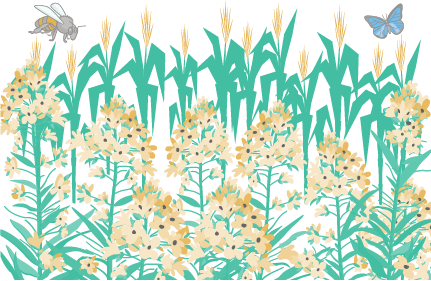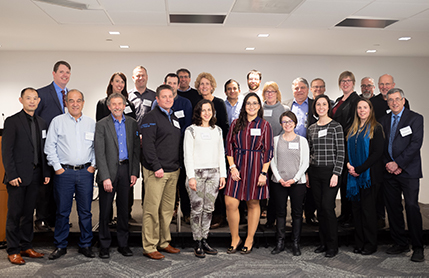Workshop on Risk Assessment for Novel Insect Resistance Technologies in Genetically Engineered Plants
-

September 14, 2023-September 15, 2023
9:00 am - 5:30 pmWashington Plaza Hotel
Washington, DC
This workshop enabled stakeholders, including risk assessors, product developers, and researchers, to discuss different aspects of non-target organism (NTO) assessment, focusing primarily on risk characterization and extrapolating the experience with Bt molecules to novel molecules. Through a series of scientific presentations and case study discussions, participants exchanged ideas on risk assessment for newer and potentially novel insect-resistant genetically engineered plants and how it would best provide value to the community as a whole. The topics for discussion included risk characterization in the context of protection goals, application of the tiered testing approach in the context of newer technologies, contextualizing uncertainties and expected effects of newer insect control technologies on NTOs, and identification of surrogate species for their testing. The outputs from the discussion, in the form of consensus points and learnings from the workshop, were documented with the intention to publish.
This in-person workshop was supported by the Agricultural Biotechnology Stewardship Technical Committee, a consortium of Bt registrants. The workshops were held on September 14-15, 2023, at the Washington Plaza Hotel in Washington, DC (10 Thomas Circle NW, Washington, DC 20005).

Agenda
Session 1: Novel Pest Control Technologies
Day 1 | Thursday | September 14, 2023 | 09:00-14:10 EST
| Time | Presentation/Activity | Presenter/Lead | |
| 09:00 | Opening of the Workshop and Introductions | Dr. Andrew Roberts Chief Executive Officer, Agriculture & Food Systems Institute |
|
| 09:30 | Problem Formulation for NTO Assessment: Context and Extrapolation to Novel Molecules | Dr. Andrew Roberts | |
| 10:00 | Protection Goals for NTO Assessment
• High-level and operational protection goals • Protection goals for threatened/non-threatened species/agricultural beneficials/charismatic organisms |
Mr. Mike Mendelsohn Chief, Emerging Technologies Branch, Biopesticides and Pollution Prevention Division, Office of Pesticide Programs, United States Environmental Protection Agency (US EPA)Dr. Subray Hegde Director, Biotechnology Risk Analysis Programs, Biotechnology Regulatory Service, Animal and Plant Health Inspection Service, United States Department of Agriculture (USDA) |
|
| 10:40 | Overview of Novel Technologies for Pest Control | ||
| • RNAi-based pesticides | Dr. Ana Maria Vélez Associate Professor, Insect Toxicology, University of Nebraska – Lincoln |
||
| • Novel Bt pesticides | Dr. Collin Preftakes Ecotoxicologist/Senior Research Entomologist, Bayer Crop Science |
||
| • Non-Bt pesticides | Dr. Chad Boeckman Global Regulatory Lead (Oilseeds) Corteva Agriscience |
||
| 11:30 | Moderated Q&A Session | Dr. Bhavneet Bajaj Manager, Scientific Programs, Agriculture & Food Systems Institute |
|
| 11:50 | Tea Break | ||
| 12:10 | Overview of Assessment Endpoints That Are Relevant In The Case of Novel Insect Resistance Technologies • Individual effects (threatened species) • Population effects (non-threatened species/ agricultural beneficials/charismatic organisms) • Threshold levels |
Dr. Amanda Pierce Senior Advisor, Office of Pesticide Programs, United States Environmental Protection Agency (US EPA) |
|
| 12:40 | Lunch | ||
| 13:40 | Tiered Testing Approach in the Context of Novel Insecticidal Molecules | Dr. Jörg Romeis Head, Biosafety Group, Agroscope, Switzerland |
Session 2: Perspective from Product Developers and Regulators
Day 1 | Thursday | September 14, 2023 | 14:10-16:00 EST
| Time | Presentation/Activity | Presenter/Lead | |
| 14:10 | Uncertainties Around NTO Assessment | ||
| • Perspective of the product developer | Dr. Christopher Brown Biotech Ecotoxicology Lead, Bayer Crop Science |
||
| • Perspective of the risk assessor | Dr. Lisa Knolhoff Senior Biological Scientist, Biotechnology Risk Analysis Programs, Biotechnology Regulatory Service, Animal and Plant Health Inspection Service, United States Department of Agriculture (USDA) |
||
| 14:40 | International Perspective from Canada | Ms. Andrea Hitchon Senior Risk Assessor, Science Branch, Canadian Food Inspection Agency, Government of Canada |
|
| 15:00 | International Perspective from Brazil | Dr. Adeney de Freitas Bueno Head of Research & Development, Embrapa Soybean (CNPSO), Brazil |
|
| 15:20 | Moderated Q&A Session | Dr. Andrew Roberts | |
| 16:00 | Tea Break |
Session 3: Case Studies of Novel Pest Control Technologies
Day 1 | Thursday | September 14, 2023 | 16:30-17:30 EST
| Time | Presentation/Activity | Presenter/Lead | |
| 16:30 | Overview of Case Studies • Nematode resistant sugar beet • Plastid-mediated RNAi approach for insect control in potato • Insect resistant tomato |
Dr. Bhavneet Bajaj | |
| 17:00 | Open Forum | Dr. Bhavneet Bajaj | |
| 17:30 | Close of Day 1 |
Session 4: Breakout Discussions
Day 2 | Friday | September 15, 2023 | 09:00-13:00 EST
| Time | Presentation/Activity | Presenter/Lead | |
| 09:00 | Recap of Day 1 | Dr. Bhavneet Bajaj | |
| 09:15 | Instructions for Case Studies and Organization into Breakout Groups | Dr. Bhavneet Bajaj | |
| 09:30 | Breakout Group Discussion | All | |
| 11:30 | Tea Break | ||
| 12:00 | Breakout Group Discussion | All | |
| 13:00 | Lunch Break |
Session 5: Group Reporting and Consensus Development
Day 2 | Friday | September 15, 2023 | 14:00-17:00 EST
| Time | Presentation/Activity | Presenter/Lead | |
| 14:00 | Presentation by Each Group and Discussion | Breakout Groups | |
| 15:30 | Recap of Group Discussion | Dr. Andrew Roberts | |
| 16:00 | Open Forum | Dr. Andrew Roberts | |
| 16:30 | Tea and Close of Day 2 |
Speakers
Bhavneet Bajaj, Ph.D.
Agriculture & Food Systems Institute
 Dr. Bhavneet Bajaj joined the Agriculture & Food Systems Institute (AFSI) in July 2018 as Scientific Program Manager. She has been involved in projects related to safety assessment of foods and feeds derived from genetically engineered plants and serves as a resource person in providing technical support for capacity building programs in biotechnology. She was also the program lead for USDA-funded technical training for Chinese and Indonesian regulators and manages operations for both the Crop Composition Database and the World Nutrient Databases for Dietary Studies.
Dr. Bhavneet Bajaj joined the Agriculture & Food Systems Institute (AFSI) in July 2018 as Scientific Program Manager. She has been involved in projects related to safety assessment of foods and feeds derived from genetically engineered plants and serves as a resource person in providing technical support for capacity building programs in biotechnology. She was also the program lead for USDA-funded technical training for Chinese and Indonesian regulators and manages operations for both the Crop Composition Database and the World Nutrient Databases for Dietary Studies.
Prior to joining AFSI, Dr. Bajaj was a Visiting Scientist at the Sustainable Agricultural Systems Laboratory, Agricultural Research Service, USDA, where she worked on carotenoid pathway regulation in tomatoes. Before then, she was Associate Investigator with the Plant Protection group at (then) DuPont, where she devised a metabolic engineering strategy for insect control in soybean. While in India, she was an Assistant Professor at Jaipur National University, where she taught genetic engineering, enzymology, and biochemistry courses to M.Sc. level students. Her research work over the past 12 years involved plant secondary metabolites of nutritional, agricultural, and medicinal importance.
Chad Boeckman, Ph.D.
Corteva Agriscience
 Chad Boeckman received both his M.S. and Ph.D. from Oklahoma State University, where his research focused on characterizing the environmental effects of point and non-point source contaminants and understanding the ecosystem effects of invasive species in a wide array of different aquatic habitats. He joined Corteva Agriscience in May 2011 and led the Ecotoxicology and Safety Assessment Laboratory in Global Regulatory Science for ten years, focusing on characterizing the environmental safety of genetically modified crops. Chad now serves as the Global Regulatory Leader for Oilseeds, where he focuses on all aspects of GM crop characterization in the pursuit of bringing these products to market. He is also heavily engaged in Monarch butterfly and pollinator conservation, along with other sustainability efforts for Corteva at both the state and national levels.
Chad Boeckman received both his M.S. and Ph.D. from Oklahoma State University, where his research focused on characterizing the environmental effects of point and non-point source contaminants and understanding the ecosystem effects of invasive species in a wide array of different aquatic habitats. He joined Corteva Agriscience in May 2011 and led the Ecotoxicology and Safety Assessment Laboratory in Global Regulatory Science for ten years, focusing on characterizing the environmental safety of genetically modified crops. Chad now serves as the Global Regulatory Leader for Oilseeds, where he focuses on all aspects of GM crop characterization in the pursuit of bringing these products to market. He is also heavily engaged in Monarch butterfly and pollinator conservation, along with other sustainability efforts for Corteva at both the state and national levels.
Chris Brown, Ph.D.
Bayer Crop Science
 Chris Brown has been involved in ecological risk assessments (ERAs) for non-target arthropods and genetically modified crops at Bayer Crop Science (previously Monsanto) since 2001. He first became interested in the topic due to the monarch butterfly/Bt corn pollen situation in 1999 and has since been implementing the principles that he learned from that experience to conduct non-target arthropod lab and field studies. Chris is also active in the area of insect conservation through involvement in a long-term project surveying tiger beetles in Missouri and leading a St. Louis entomology group. He obtained an M.A. in biology from Washington University and a Ph.D. in ecology and environmental science with a focus on entomology and risk assessment from Montana State University.
Chris Brown has been involved in ecological risk assessments (ERAs) for non-target arthropods and genetically modified crops at Bayer Crop Science (previously Monsanto) since 2001. He first became interested in the topic due to the monarch butterfly/Bt corn pollen situation in 1999 and has since been implementing the principles that he learned from that experience to conduct non-target arthropod lab and field studies. Chris is also active in the area of insect conservation through involvement in a long-term project surveying tiger beetles in Missouri and leading a St. Louis entomology group. He obtained an M.A. in biology from Washington University and a Ph.D. in ecology and environmental science with a focus on entomology and risk assessment from Montana State University.
Adeney de Freitas Bueno, Ph.D.
Embrapa Soybean
 After earning a Ph.D. in Entomology in 2004, Dr. Adeney de Freitas Bueno worked as a Field Scientist at Dow AgroSciences from 2004-2006 in the Cerrados Region in Brazil. In 2006, he joined Embrapa Soybean in Londrina, Paraná as a Researcher, and he became the Head of Research and Development starting in 2022. With more than 130 papers published in scientific journals, Dr. Bueno has dedicated his studies to biological control, economic thresholds, and IPM in soybeans. Dr. Bueno has also been the advisor of 39 Ph.D. and master’s students thus far, and he also works as an Associate Editor of multiple scientific journals.
After earning a Ph.D. in Entomology in 2004, Dr. Adeney de Freitas Bueno worked as a Field Scientist at Dow AgroSciences from 2004-2006 in the Cerrados Region in Brazil. In 2006, he joined Embrapa Soybean in Londrina, Paraná as a Researcher, and he became the Head of Research and Development starting in 2022. With more than 130 papers published in scientific journals, Dr. Bueno has dedicated his studies to biological control, economic thresholds, and IPM in soybeans. Dr. Bueno has also been the advisor of 39 Ph.D. and master’s students thus far, and he also works as an Associate Editor of multiple scientific journals.
Subray Hegde, Ph.D.
Biotechnology Regulatory Services, USDA APHIS
 Dr. Subray Hegde currently holds the position of Director for the Biotechnology Risk Analysis Programs (BRAP) within the Biotechnology Regulatory Services of the U.S. Department of Agriculture Animal and Plant Health Inspection Service (USDA APHIS). His responsibilities include granting permits for the introduction of organisms, such as plants, insects, and microorganisms, modified through genetic engineering. He also reviews requests for unconfined field release of modified plants, determines whether modified plants need to follow the USDA’s revised regulations, provides feedback to developers on whether their modified plants are eligible for regulatory exemptions, and aids BRS in its international capacity building activities. He holds a Ph.D. in Plant Genetics.
Dr. Subray Hegde currently holds the position of Director for the Biotechnology Risk Analysis Programs (BRAP) within the Biotechnology Regulatory Services of the U.S. Department of Agriculture Animal and Plant Health Inspection Service (USDA APHIS). His responsibilities include granting permits for the introduction of organisms, such as plants, insects, and microorganisms, modified through genetic engineering. He also reviews requests for unconfined field release of modified plants, determines whether modified plants need to follow the USDA’s revised regulations, provides feedback to developers on whether their modified plants are eligible for regulatory exemptions, and aids BRS in its international capacity building activities. He holds a Ph.D. in Plant Genetics.
Andrea Hitchon
Canadian Food Inspection Agency
 Andrea Hitchon is a Senior Risk Assessor for the Government of Canada, employed by the Canadian Food Inspection Agency. Andrea has been working on the environmental safety of genetically modified plants since 2015, focusing on non-target organisms and insect resistance management. She has completed non-target organism reviews for over 15 authorized plants, which include novel traits conveyed by RNAi, Bt proteins, and pesticidal non-Bt proteins. Andrea has also worked on updating national policies for plants with novel traits, including for gene-edited plants and plants similar to those already authorized. Andrea holds a Master of Science from the University of Guelph, Canada.
Andrea Hitchon is a Senior Risk Assessor for the Government of Canada, employed by the Canadian Food Inspection Agency. Andrea has been working on the environmental safety of genetically modified plants since 2015, focusing on non-target organisms and insect resistance management. She has completed non-target organism reviews for over 15 authorized plants, which include novel traits conveyed by RNAi, Bt proteins, and pesticidal non-Bt proteins. Andrea has also worked on updating national policies for plants with novel traits, including for gene-edited plants and plants similar to those already authorized. Andrea holds a Master of Science from the University of Guelph, Canada.
Lisa Knolhoff, Ph.D.
Biotechnology Regulatory Services, USDA APHIS
 Dr. Lisa Knolhoff works for the U.S. Department of Agriculture (USDA) in Biotechnology Regulatory Services (BRS), within the Animal and Plant Health Inspection Service (APHIS). She has been with BRS since 2016, where she performs technical reviews and risk assessments of genetically engineered plants, insects, and microbes. She obtained her Ph.D. in entomology from the University of Illinois, after which she conducted postdoctoral research at the Max Planck Institute for Chemical Ecology in Jena, Germany. She has also worked in private industry, conducting research on transgenic insecticidal crops. Her background includes insect behavior, genetics, host plant adaptation, and evolution of resistance.
Dr. Lisa Knolhoff works for the U.S. Department of Agriculture (USDA) in Biotechnology Regulatory Services (BRS), within the Animal and Plant Health Inspection Service (APHIS). She has been with BRS since 2016, where she performs technical reviews and risk assessments of genetically engineered plants, insects, and microbes. She obtained her Ph.D. in entomology from the University of Illinois, after which she conducted postdoctoral research at the Max Planck Institute for Chemical Ecology in Jena, Germany. She has also worked in private industry, conducting research on transgenic insecticidal crops. Her background includes insect behavior, genetics, host plant adaptation, and evolution of resistance.
Amanda Pierce, Ph.D.
Office of Pesticide Programs, EPA
 Dr. Amanda Pierce is a Senior Advisor in the Emerging Technologies Branch in the Office of Pesticide Programs at the United States Environmental Protection Agency (EPA), where she evaluates and ensures the safety of novel applications of recent discoveries in genetics and molecular biology to real-world pest control problems, e.g., genetically engineered animals for pest population control and plant-incorporated protectants. At EPA, she focuses on advancing ecological risk assessment and policy initiatives for these biotechnologies within the United States government and internationally. She received her Ph.D. in Population Biology, Ecology and Evolution from Emory University. After a postdoctoral fellowship at the University of North Carolina- Chapel Hill, Amanda became a AAAS Science & Technology Policy Fellow at EPA, where she applied her population genetics expertise to developing risk assessment frameworks for emerging technologies.
Dr. Amanda Pierce is a Senior Advisor in the Emerging Technologies Branch in the Office of Pesticide Programs at the United States Environmental Protection Agency (EPA), where she evaluates and ensures the safety of novel applications of recent discoveries in genetics and molecular biology to real-world pest control problems, e.g., genetically engineered animals for pest population control and plant-incorporated protectants. At EPA, she focuses on advancing ecological risk assessment and policy initiatives for these biotechnologies within the United States government and internationally. She received her Ph.D. in Population Biology, Ecology and Evolution from Emory University. After a postdoctoral fellowship at the University of North Carolina- Chapel Hill, Amanda became a AAAS Science & Technology Policy Fellow at EPA, where she applied her population genetics expertise to developing risk assessment frameworks for emerging technologies.
Collin Preftakes, Ph.D.
Bayer Crop Science
 Collin Preftakes has been involved in ecological risk assessments (ERAs) for non-target arthropods and genetically modified crops at Bayer Crop Science (previously Monsanto) since 2017. He has formal training in entomology and risk assessment, with a Ph.D. from Montana State University that focused on risk to non-target organisms resulting from spray drift of conventional insecticides. Collin regularly applies principles of the tiered approach risk assessment paradigm to develop and implement ERAs for genetically modified crops in support of global registration.
Collin Preftakes has been involved in ecological risk assessments (ERAs) for non-target arthropods and genetically modified crops at Bayer Crop Science (previously Monsanto) since 2017. He has formal training in entomology and risk assessment, with a Ph.D. from Montana State University that focused on risk to non-target organisms resulting from spray drift of conventional insecticides. Collin regularly applies principles of the tiered approach risk assessment paradigm to develop and implement ERAs for genetically modified crops in support of global registration.
Andrew Roberts, Ph.D.
Agriculture & Food Systems Institute
 Dr. Andrew Roberts joined the Agriculture & Food Systems Institute (AFSI) in December 2009 as the Deputy Director of the Center for Environmental Risk Assessment (CERA), where he developed tools and materials for use in training and capacity building related to the problem formulation approach to environmental risk assessment and served as the coordinator for CERA’s capacity building projects under the USAID-funded South Asia Biosafety Program (SABP) and the World Bank-funded Partnership for Biosafety Risk Assessment and Regulation, in Bangladesh, Pakistan, and Vietnam. He also provided technical support for capacity building work in Brazil, India, Japan, Chile, and South Africa. In January 2015, he became the director of CERA, as well as the Center for Safety Assessment of Food and Feed (CSAFF), which worked on food and feed safety assessment for foods derived from genetically engineered plants. The two centers were later consolidated under the Research Foundation, for which he became Deputy Executive Director in January 2017. When the organization became the Agriculture & Food Systems Institute in 2020, his title shifted to Vice President – Biotechnology, and he assumed the role of Chief Executive Officer later that year.
Dr. Andrew Roberts joined the Agriculture & Food Systems Institute (AFSI) in December 2009 as the Deputy Director of the Center for Environmental Risk Assessment (CERA), where he developed tools and materials for use in training and capacity building related to the problem formulation approach to environmental risk assessment and served as the coordinator for CERA’s capacity building projects under the USAID-funded South Asia Biosafety Program (SABP) and the World Bank-funded Partnership for Biosafety Risk Assessment and Regulation, in Bangladesh, Pakistan, and Vietnam. He also provided technical support for capacity building work in Brazil, India, Japan, Chile, and South Africa. In January 2015, he became the director of CERA, as well as the Center for Safety Assessment of Food and Feed (CSAFF), which worked on food and feed safety assessment for foods derived from genetically engineered plants. The two centers were later consolidated under the Research Foundation, for which he became Deputy Executive Director in January 2017. When the organization became the Agriculture & Food Systems Institute in 2020, his title shifted to Vice President – Biotechnology, and he assumed the role of Chief Executive Officer later that year.
Prior to joining AFSI, Dr. Roberts worked at the U.S. Department of Agriculture (USDA) in several different capacities, all related to the regulation of agricultural biotechnology. He began his career at USDA as an AAAS Risk Policy Fellow in the Office of Science of Biotechnology Regulatory Services (BRS), the group responsible for regulating genetically engineered plants at USDA’s Animal Plant Health Inspection Service. After spending a year in the New Technologies office of the Foreign Agricultural Service serving as the lead for USDA’s efforts related to the Cartagena Protocol on Biosafety, he returned to BRS to serve in the International Affairs branch where he remained until joining AFSI.
Jörg Romeis, Ph.D.
Agroscope
 Jörg Romeis is the head of the Biosafety Group at Agroscope in Zurich, Switzerland. Agroscope is the Swiss center of excellence for agricultural research and is affiliated with the Federal Office for Agriculture. He has an M.Sc. in biology and has been trained as an applied entomologist with a focus on biological control and multi-trophic interactions. He has more than 20 years of experience in non-target risk assessment of transgenic crops and the design and execution of non-target laboratory studies in particular. Besides research projects to investigate non-target impacts of selected transgenic plants and insecticidal compounds, he has also been actively involved in developing testing protocols and guidelines for non-target risk assessment. In 2023, he became the president of the International Society for Biosafety Research (ISBR), which aims to promote scientifically sound research that supports biosafety assessment.
Jörg Romeis is the head of the Biosafety Group at Agroscope in Zurich, Switzerland. Agroscope is the Swiss center of excellence for agricultural research and is affiliated with the Federal Office for Agriculture. He has an M.Sc. in biology and has been trained as an applied entomologist with a focus on biological control and multi-trophic interactions. He has more than 20 years of experience in non-target risk assessment of transgenic crops and the design and execution of non-target laboratory studies in particular. Besides research projects to investigate non-target impacts of selected transgenic plants and insecticidal compounds, he has also been actively involved in developing testing protocols and guidelines for non-target risk assessment. In 2023, he became the president of the International Society for Biosafety Research (ISBR), which aims to promote scientifically sound research that supports biosafety assessment.
Ana M. Vélez, Ph.D.
University of Nebraska-Lincoln
 Dr. Ana M. Vélez is an Associate Professor in the Department of Entomology at the University of Nebraska-Lincoln. Her research focuses on understanding how insects respond and adapt to chemical stressors, with a particular interest in RNA interference for western corn rootworm management.
Dr. Ana M. Vélez is an Associate Professor in the Department of Entomology at the University of Nebraska-Lincoln. Her research focuses on understanding how insects respond and adapt to chemical stressors, with a particular interest in RNA interference for western corn rootworm management.


